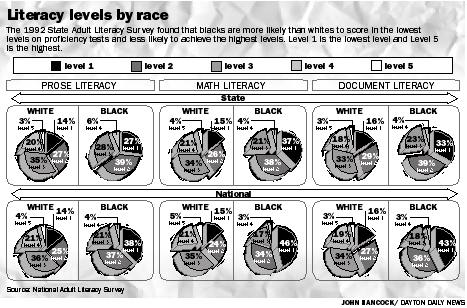LITERACY
PROGRAM TEACHES BASIC SKILLS
Adult Basic Literacy Education program at Arlington Courts part of national plan.
By Tom Beyerlein Dayton Daily News Published: Tuesday, May 5, 1998Sidebar to Part 3
"You are not finished when you lose," reads the sign on the wall in the
Arlington Courts Community Center. "You're finished when you quit."
Annette Good said she was once a quitter. "I would rather quit (school) than put up with the struggle of, `OK, you're
slow, but you can do it if you work at it,''' said Good, 40, a high school
dropout.
"I would rather quit (school) than put up with the struggle of, `OK, you're
slow, but you can do it if you work at it,''' said Good, 40, a high school
dropout.
Now Good is a literacy student in the Adult Basic Literacy Education, or ABLE, program at Arlington Courts, where she lives.
"Last year, I made an agreement with God and myself," Good said. "I want an education, I want to go to college. I want to better myself as an individual - it's like a personal self-esteem thing."
ABLE is a nationwide program that teaches basic literacy skills and prepares students for the General Educational Development high school equivalency exam.
There are 14 ABLE centers in Dayton, operated by the city schools.
Dayton ABLE Director Joyce Dent said the city's ABLE centers work with 2,100 to 2,200 students per year - this year they range in age from 18-74.
Some are in the program as a condition of probation, but most are there because they know they need to learn, Dent said.
"They want a better life. They want to be financially secure. They want to feel good about themselves," agreed Gail Peoples, ABLE instructor at Arlington Courts in West Dayton.
"And they've come to the realization that education is the key to success. You come to a point in life where it just clicks and you say, `I can't go on like this. I've got to do something.'"
ABLE has been at the Arlington Courts housing project for about a year. Twenty students attend two-and-a-half hour classes four days a week in the predominantly black neighborhood.
Literacy problems affect people of all races, but studies show blacks are more likely than whites to score in the lower literacy levels on proficiency tests and less likely to achieve the highest levels.
There also is a strong link between low literacy levels and poverty.
Peoples said many of her students have pressing problems in their lives that distract them from learning.
"I would say about 70 percent stick with it. The rest of them have so many social issues they can't put anything more on their plate.
"They may be thinking, `I'm sitting here right now, but I know in a few hours my lights might be cut off.'"
ABLE, which has been in existence for more than 20 years, uses a combination of curricula to teach reading, science and math.
These days, Peoples said, program officials also try to incorporate "life skills," like buying a house and balancing a checkbook, and skills to help students get and retain jobs.

Part 3 sidebars:* teaching basic skills* second language classes * two immigrants' stories * literacy by race * document literacy |
Back to Part 2 Go to Part 4 |